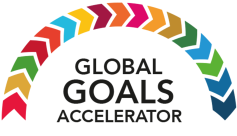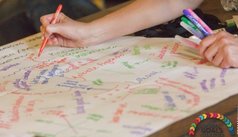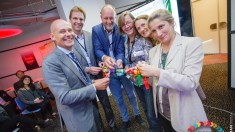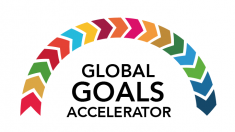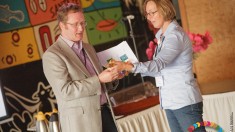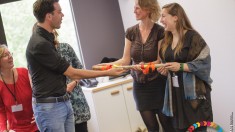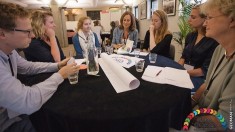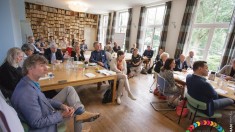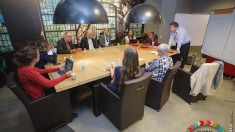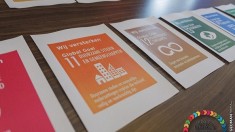Sustainable Development Goals – connect on all levels10 recommendations to ensure acceleration
Amsterdam, April 2017 Seventeen months ago, the 17 Global Goals for Sustainable Development, in short the SDGs, were adopted by the United Nations. Achieving the Global Goals, with 2030 as dot on the horizon, is the responsibility of all actors in society, in all parts of the world. The SDGs together act as a change agenda that can create more balance in the world and ensures that nobody stays behind. An agenda for the common good and an ambitious agenda, with 14 years to go.
The targets that have been defined as part of the 17 SDGs in areas like poverty, health, water and sanitation, inclusion, gender, peace, ecosystems on land and in the sea and responsible production and consumption, are closely related. They cannot be viewed individually and they cannot be solved individually. This is the greatest challenge of today, how to interlink people, ecosystems and different interests, while polarization and nationalism are on the rise. The necessity to solve the 17 goals in conjunction with each other requires collaboration and crossing boundaries and comfort zones. In fact, it requires a new social contract. Without fundamental changes to the way in which we design our society, nothing will be achieved. To stand still is to really go backwards. New overarching views, inspired by the shared values and principles as described in the Earth Charter can make achieving these goals easier and innovate society in a lasting manner. We therefore stress the importance of nurturing the connecting framework that supports achieving the individual sustainable development goals. In 2016 – the very first year of raising awareness and implementation of the SDGs, there have been meetings, discussions and even some campaigns, both in the Netherlands and worldwide. In the Netherlands different actors initiated such events and there is an effort to create multi- stakeholder cooperation. A new initiative was taken by Earth Charter The Netherlands together with the Sustainable Development Dialogue. Other networks and enterpreneurs were brought together and a series of dialogues was organised on the SDGs from an Earth Charter perspective. The title of this new coalition - ‘Global Goals Accelerator’ - is inspired on the last sentence of the Earth Charter, specifically the word ‘quickening’: Let ours be a time remembered for the awakening of a new reverence for life, the firm resolve to achieve sustainability, the quickening of the struggle for justice and peace, and the joyful celebration of life. In this article we share a number of views presented in the Global Goals Accelerator sessions in the form of recommendations for the Netherlands and beyond. 1. Stand up for future generations The sooner we involve future generations and young people in policy- making, the better. All policies should be checked against effects and costs in the future, in order to prevent us constantly being overtaken by events. An Ombudsperson or guardian for Future Generations should therefore be appointed as soon as possible. We have a few inspiring examples in Wales, Finland and Israel. If the Netherlands would appoint such an ombudsperson, it would directly contribute towards the implementation of SDG 16 regarding inclusive institutions. The mindset to involve future generations in policy-making will immediately have an effect on all 17 goals. Detailed plans that support this broadly based proposal have already been made (see reader’s guide). 2. More attention to gender equality and empowerment of women and girls in all policy areas and life domains. Every society will greatly benefit if 100% of its population is fully valued and all talents are put to full use. There is still a lot that needs to be done in nearly all countries when it comes to e.g. healthcare (gender-sensitive care), bridging the gender wage gap, improving diversity and inclusion in higher management, rights and a fair apportionment of work and care. The Netherlands will directly contribute to the implementation of SDG 2 (health), SDG 5 (equality men and women), SDG 10 (reduce differences) and SDG 16 (inclusive institutions) by continuing its efforts at home and abroad. 3. Attention for the importance of sustainable lifestyles and the accompanying behavioural changes in all actors in society. Information and awareness boost change. Here, we don’t have a widely shared sense of ownership yet. Who is mobilizing broad support within companies and the authorities for the necessary changes? Who is taking the initiative to make own processes and the supply chain more sustainable? All stakeholders including shareholders and other financial backers need to become aware of their responsibility. On a local and national government level the policy for sustainable procurement can be improved and more strictly observed. Citizens and consumers can vote using their wallets, their feet and of course the democratic processes. A mindset that focuses on the implications of the 17 goals for citizens, entrepreneurs and politicians will have an accelerating effect on the fulfilment of the goals. 4. Raise not only ‘homo economicus’ but also ‘homo sociales’. Assign clear talks to education when it comes to sustainability and look at education as the driving force for sustainable knowledge and behaviour. Bring the world into the schools. Let education adopt a more holistic view in which all 17 goals come together. Let’s change systems and incentives in such a way that young people receive proper guidance and become adults that are included and able to handle the complexity of today’s society. 5. Ensure sustainable and healthy production and products based on new economic and ethical values. Starting principles should be supply chain innovation, circular, from owning to using, local where possible and good for people and planet. Do not only consider the impact of people on the environment, but also the impact of the environment and our system on people. Use both rewards and retribution. Reform taxes. Companies benefit from unambiguous parameters that reward investments in sustainability and make the polluter pay. 6. Transforming financial systems. Money and sustainability are not an obvious match. Still, the financial sector in a broad sense holds the key to accelerating sustainability. The ‘true price’ and ‘true impact’ are the motor for sustainable change. Find out whether fresh water as ecosystem can become the new standard for the financial sector. 7. Choose the nationwide footprint as a measuring tool for successful implementation of the SDGs in each of our own countries. In the to-do lists for the implementation of the SDGs the focus is still too much on what we produce and consume within the national borders, whereas for instance the Dutch footprint goes far beyond those borders. Incorporate the nationwide footprint in the national SDGs reports to the UN. 8. The power of local collaboration and civic participation can increase enormously. This has an incredible organizational potential. Cooperative collaboration is recently being rediscovered in the Netherlands as a democratic form of collaboration. In this way, it is possible to act on equal terms with multiple local actors. As a result, the many green deals can gain momentum. The energy agreement can be further strengthened by citizens’ initiatives. All goals benefit from a strong and all-round social embedding. No full-fledged democracy without transparency and community-up participation. With a view to transparency and civic rights, strengthening the democracy should therefore be linked to strengthening local journalism. 9. Not many people are familiar with the SDGs yet. Communication about Agenda 2030 and the SDGs is not a goal in itself, but does, however, contribute to achieving all 17 goals. Make sure all governmental levels and all ministries and government members feel ownership of the SDGs. This also applies to companies and non-governmental organizations which will start to consider promoting the SDGs as part of their responsibility. An appealing communication strategy and an interrelated community platform for the SDGs worldwide and per country can accelerate the fulfilment of the goals. With a focus on involving and informing a wide audience about the SDGs and perspectives for action for a sustainable lifestyle. In this era of social media and interactive communication it’s essential that SDGs become part of the online discussions. Set ambitious targets for reaching and involving a varied audience in the movement for achieving the sustainability goals. 10. Put the SDGs at the heart of public authorities. The SDGs in the Netherlands are still too much the responsibility of Foreign Affairs. This results in a weak level of support at other ministries and departments. For the Ministry of Education it is yet unclear whether they have a task to fulfil as well. Line ministers and aldermen need to be fully aligned and able to enhance the internal level of support. Public authorities can act as launching customer, inspector and inspirer and will receive ample room for the leading role they seek to fulfil. However, this leading role needs to be carried out based on an integrated approach and a strong sense of mutual affiliation. Inspiring examples can be found in countries like Sweden, Canada and Bhutan. These 10 recommendations will ensure an accelerated achievement of the SDGs. But that is not all and not even the greatest gain. These 10 recommendations will first and foremost turn the world into an even nicer place to live in and to grow up in. A society that shows that sustainabilization in a broad sense is not necessarily at odds with a healthy economy. Just imagine how proud we would be if the Netherlands will serve as an example. Let us embrace the SDGs, not only as the ‘to do list’ of the world, but also as the social contract of the world. With the Earth Charter as its ethical foundation. Agenda 2030 with the SDGs provides each of us – no matter our status or position in society - with a license to operate. No need to wait for others, an authority or signatory. Veronique Swinkels (Sustainability Dialogue, Earth Charter Friend and Global Goals Accelerator, The Netherlands)
Alide Roerink (Earth Charter Netherlands and Global Goals Accelerator) Reader’s guide
http://www.earthcharter.nl/ http://www.worldconnectors.nl/en/themes/future-generations http://www.njr.nl/ http://www.missingchapter.org/ http://www.groenegeneratie.nl/ http://www.sdgnederland.nl/campagnes/global-goals-accelerator/ware-aard- onderwijs/ https://www.womeninc.nl/gezondheid/ https://www.oneworld.nl/global-goals/de-uitdaging-voor-de-komende-vijftien-jaar-hoe-maken-we-megasteden-duurzaam/ http://nivoz.nl/over-nivoz/nivoz-manifest-ieder- mens-verantwoordelijk-en-verbonden-samenleving/ http://www.sdgnederland.nl/campagnes/global-goals-accelerator/we-moeten- duurzamer-produceren-zaadje-tot-karbonaadje/ http://www.thequestionmark.org/ http://trueprice.org/businesses-and-financial-institutions/what-do-we-do/true-price/ www.sdgnederland.nl/campagnes/global-goals-accelerator/zou-heerlijk-om- op-aarde-blijven-wonen www.sdgnederland.nl/campagnes/global-goals-accelerator/laat-noordzee-voorbeeld-rest-wereld/ waterfootprint.org/en/standard/ www.voetafdruknederland.nl/over-de-voetafdruk/ www.sdgnederland.nl/campagnes/global-goals-accelerator/klimaatverandering-onder-de-loep/ http://www.sdgnederland.nl/campagnes/global-goals-accelerator/finale-global- goals-accelerator-hoe-zie-wereld-2030/ http://agora-europa.nl/ http://krachtinnl.nl/ www.swemfa.se/campaigns/first-generation/ |
Meer artikelen over de resultaten:Global Goals> we hebben allemaal een 'License to operate'VERSLAG - 15 juli 2016 – In juni en juli 2016 organiseerde de Global Goals Accelerator 8 inspirerende estafettebijeenkomsten waarbij alle 17 Global Goals (SDG’s) werden besproken en meer dan 200 mensen waren betrokken. Lees meer...
Hoe zie jij Utrecht voor je in 2030?VERSLAG - 17 okt. 2016 – Vorige week maandag, op de dag van de duurzaamheid, stond Utrecht in het teken van de 17 Duurzame Ontwikkelingsdoelen. Lees verder...
Finale Global Goals Accelerator: hoe zie jij de wereld in 2030?VERSLAG - 15 juli 2016 – Dinsdag 7 juni was het alweer tijd voor de laatste Global Goals Accelerator bijeenkomst over vrede en veiligheid. Lees verder...
De Global Goals Accelerator gaat van startACTUEEL - 2 juni 2016 – Participeer in de Global Goals Accelerator estafettebijeenkomsten, volg de dialoog op weg naar de realisering van de doelen in 2030. Lees verder...
Laat de Noordzee een voorbeeld zijn voor de rest van de wereldVERSLAG - 13 juli 2016 – De zevende Global Goals Accelerator bijeenkomst ging over het beschermen van zeeën en oceanen, over biodiversiteit en ecosystemen. Lees verder...
Klimaatverandering onder de loepACHTERGROND - 30 juni 2016 – Afgelopen donderdag stond de Global Goals Accelerator in het teken van betaalbare energie en klimaatverandering. Lees verder...
‘We moeten duurzamer produceren, van zaadje tot karbonaadje’VERSLAG - 17 juni 2016 – Tijdens de 2e bijeenkomst van de Global Goals Accelerator spraken foodies en experts over voedselzekerheid en duurzame consumptie en productie. Lees verder...
‘Wat zou het heerlijk zijn om op aarde te blijven wonen’VERSLAG - 9 juli 2016 – Duurzame denkers en doeners bogen zich afgelopen dinsdag het hoofd over de Global Goals tijdens de eerste bijeenkomst van de Global Goals Accelerator... Lees verder...
De ware aard van onderwijsVERSLAG - 8 juli 2016 – Leerkrachten, vertegenwoordigers van onderwijsinstanties en andere geïnteresseerden gingen vorige week met elkaar in gesprek over Global Goal 4... Lees verder...
Water als medicijn voor ontwikkelingVERSLAG - 6 juli 2016 – Water en gezondheid werden vorige week dinsdag flink onder de loep genomen tijdens de vijfde Global Goals Accelerator bijeenkomst. Lees verder...
De uitdaging voor de komende vijftien jaar: hoe maken we megasteden duurzaam?VERSLAG - 27 juni 2016 – Van dorp naar megastad. Tegen 2030 woont ten minste 70 procent van de wereldbevolking in steden. De grote vraag: hoe maken we deze duurzaam? Lees verder...
|
